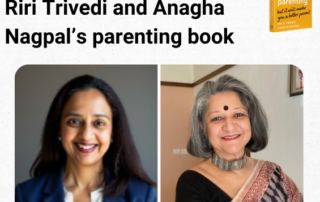Deccan Chronicle featuring Riri Trivedi and Anagha Nagpal’s parenting book: This Book Won’t Teach You Parenting – May, 2025
Psychotherapist Riri G. Trivedi and parent educator Anagha Nagpal have co-authored a book that explores Indian parenting through the lens of healing childhood trauma, encouraging self-reflection, and breaking negative patterns. The book also highlights ways parents can model calm, regulated responses to stress for their children. It was featured in The Deccan Chronicle’s ‘Bookmark’ segment, where Neil Pate curates and reviews notable new releases. The article outlines the book’s key themes and explains how it equips readers with practical tools to navigate the complexities of modern parenting. The editor adds that Trivedi and Nagpal offer a “parenting compass” for




